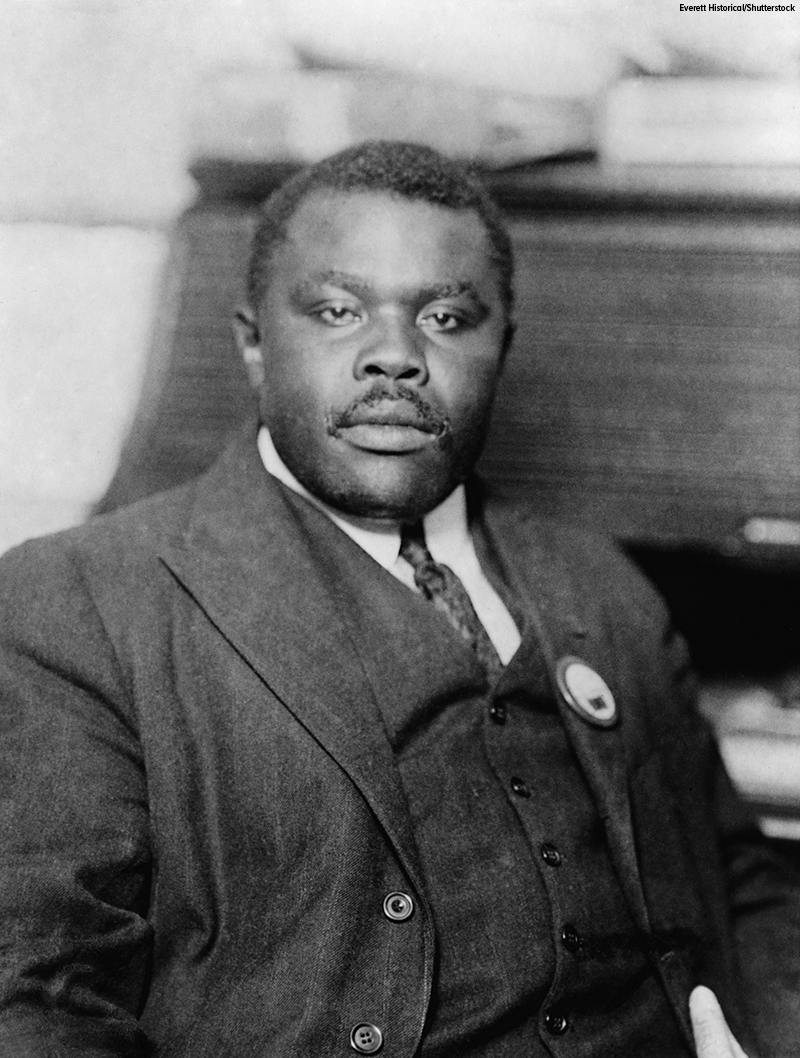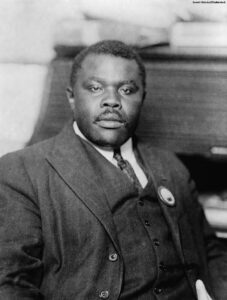
Black History Month is a time to honor and celebrate the many achievements and contributions of Black Americans. This week btw examines the life of activist and civil rights leader Marcus Garvey. He returned to news feeds recently because Garvey was pardoned for a 1923 mail fraud conviction by President Biden in January 2025. Read on to learn more about the story.
Garvey’s Influence and the UNIA

Marcus Garvey was born on August 17, 1887, in St. Ann’s Bay, Jamaica. In 1914, he founded the Universal Negro Improvement Association and African Communities League (UNIA) to promote unity and pride among Black people worldwide. The UNIA eventually grew to a membership of six million people in forty countries. Garvey believed that economic and political independence was a necessity for true freedom for Black people around the world.
In 1916, Garvey traveled to the U.S. and began giving powerful speeches about Black pride and what was called “Negro Nationalism.” Garvey was inspired in part by American activist Booker T. Washington who called for African Americans to focus on self-reliance as the key to full social and economic freedom. Garvey’s goals inspired later civil rights activists, such as Malcolm X and Dr. Martin Luther King, Jr.
In fact, Dr. King credits Garvey as being the first person to lead a large-scale movement of African Americans. In 1920, Garvey organized the International Conference for the Negro Peoples of the World in New York City. Tens of thousands of people attended. At the conference, the UNIA adopted a human rights document that described injustices faced by Black people around the world and expressed the need for unity. Garvey also spoke about the Back to Africa political movement, which encouraged descendants of enslaved Africans to return to their roots in Africa. The emerging African American middle class that was beginning to grow in the 1920s did not embrace all of Garvey’s ideas. Garvey’s strong emphasis on cultural separation also put him at odds with some African American artists during the Harlem Renaissance. Garvey did not appreciate that these artists operated within the existing culture of the period.
The U.S. government was also wary of Garvey’s strong, public support of racial independence. The Federal Bureau of Investigation began to investigate Garvey and started looking for reasons to deport him back to Jamaica.
Garvey is Arrested
Garvey’s belief in economic independence for Black people led him to open several businesses. One of these was the Black Star Line, a shipping line devoted to carrying goods and people from the United States back to Africa. The Black Star Line failed, as did many businesses at the start of the Great Depression. Once this happened, the U.S. government arrested Garvey, claiming that he had used the U.S. mail service in illegal business schemes. In 1923, he was convicted of one count of mail fraud and fined $1,000. He was also sentenced to five years in prison at the Atlanta federal penitentiary: the maximum punishment possible under the law.
Garvey remained free on bail for two more years while he appealed the conviction but after the appeal was denied in 1925, he was imprisoned. His imprisonment permanently damaged his reputation. The UNIA movement also lost momentum.
The Road to Pardon
Supporters of UNIA and Garvey spoke out about his conviction and imprisonment. In 1927, President Calvin Coolidge commuted the remaining time on Garvey’s sentence, and he was released from prison. He was deported to Jamaica where he lived for a few years before moving to London England, where he died in 1940.
Garvey is a national hero in Jamaica. His portrait is painted on the walls of school buildings there. Nevertheless, activists and political figures worked with no luck for decades to clear Garvey’s name in the United States. They were told that there were several political roadblocks preventing it, including the accusation that Garvey was anti-Semitic. This claim was later proven to be false.
In December 2024, Representative Yvette D. Clarke of New York, along with twenty other members of Congress, wrote letters to President Biden, asking him to pardon Garvey. This time, they were successful. Garvey was finally pardoned in the final days of President Biden’s time in the White House. The pardon came on January 19, 2025–101 years after Garvey’s conviction.
